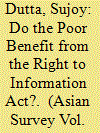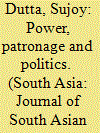| Srl | Item |
| 1 |
ID:
185982


|
|
|
|
|
| Summary/Abstract |
I investigate to what extent India’s Right to Information Act is useful for poor households. Drawing on empirical data from central Uttar Pradesh, I study two categories of poor households—urban and rural—possessing Below Poverty Line cards. These cards entitle their holders to several subsidies, but they are poorly targeted: certain communities receive more cards, while most of the deserving poor do not receive them. The Act is meant to create space for democratization, enabling the poor to challenge local power holders; but there are obstacles to their taking advantage of it. They are scarcely educated, and unaware of the Act, and they get no support from government agencies responsible for implementing it. This has encouraged the use of manipulative tactics by local representatives and government bureaucrats seeking power, control, and domination. But the poor do find ways to receive their entitlements.
|
|
|
|
|
|
|
|
|
|
|
|
|
|
|
|
| 2 |
ID:
114014


|
|
|
|
|
| Publication |
2012.
|
| Summary/Abstract |
This paper conceptualises the culture of corruption and clientelism in panchayat elections in Uttar Pradesh. The discussion is based on a year of field research on the strategies adopted by power-holders to monopolise these local bodies. The study found that patronage, influence and intimidation are used by the dominant factions to retain considerable control over the panchayats. While this in itself is not especially new, the study demonstrates the ways in which government initiatives to ensure greater transparency and representation of marginal groups-lower castes and women, in particular-through reservations continue to be cleverly subverted. A successful pradhan (headman) establishes a network of supporters and alliances, which he nurtures and rewards by brokering and embezzling funds through the institutions that he controls, instead of neutrally devolving funding to the needy sectors of the village.
|
|
|
|
|
|
|
|
|
|
|
|
|
|
|
|